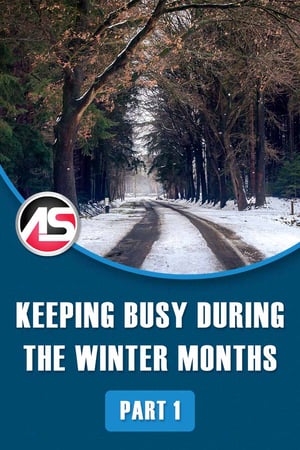
 Wintertime IS the Time for Northern Contractors to Grow a Polyurethane Injection Business
Wintertime IS the Time for Northern Contractors to Grow a Polyurethane Injection Business
So, you think because it’s cold and the ground is frozen, it’s time to hang it up and winterize all your polyurethane injection equipment? Time to start bowling, shooting pool, ice fishing, hunting, drinking, etc.? Okay, maybe that is not the way to start a blog; a guy who has never lived north of Atlanta, telling contractors in the northern USA what they could be doing in the winter. But I implore you; please read on and consider the other fun stuff you could be doing and getting paid for.
Specialty chemical grouting contractors that operate in the northern USA face a more limited window of time to get outdoor soil stabilization and slab lifting work done. They have earned the right to take it easy in the winter because they typically work twice as hard as everyone else when the weather cooperates. With proper planning though, northern poly contractors can stay busy in the cold months as well. In this two-part blog series, we will cover what those wintertime opportunities are and how to make them happen.
What Geotechnical Work Can Be Done in the Winter?
When I talk about geotechnical work, I am primarily referring to concrete slab lifting and soil stabilization/ground improvement. Here are some winter targets to consider:
- Warehouses and Distribution Centers – Interior slab lifting and void filling behind loading dock walls.
- Office and Retail – Interior slab lifting and tripping hazard mitigation.
- Infrastructure – Below the frost line, groundwater infiltration into stormwater and sewer pipes causes loss of soil density and settling of pavement. Infiltration can be halted, voids filled, and soil density restored through a chemical grouting program.
- Agricultural Facilities – Leveling slabs in grain-drying bunkers.
- Commercial / Industrial – Filling voids and leveling slabs in plants and factories.
What about other polyurethane injection work? Winter is a great time to learn some new skills like crack injection, slab undersealing, and curtain grouting. When it gets cold, concrete shrinks, and cracks and joints open up and can start leaking. They are actually easier to inject when it’s cold. The market for this kind of work is practically unlimited. Consider these areas where waterproofing work needs to be done:
- Below-grade parking structures – Every underground parking structure leaks through cracks, expansion joints, and cold joints. These can be injected with Alchemy-Spetec leak seal resins. If the concrete is in bad condition, a curtain wall grouting program can be implemented to basically create a membrane between the groundwater and the concrete.
- Elevator pits – Any below-grade concrete structure can potentially leak. Elevator pits, especially in areas with high water tables, routinely leak. How many elevators do you think are in New York City, Boston, Philadelphia, and Chicago? These are all cities basically at sea level.
- Tunnels (Pedestrian, Vehicle, Mass Transit) - These all suffer from water intrusion and can be injected with polyurethane resins.
- Dams – It’s kind of scary to think about huge concrete dams leaking but it is indeed the case. A lot of crack injection work is done in dam galleries during the winter.
- Residential and Commercial Building Basement Waterproofing – Cracks and joints leak year-round but when it’s cold they are easier to inject.
- Slab Undersealing – This is the same as curtain wall grouting. The difference is that it’s done through the floor instead of through a wall.
Alchemy-Spetec’s Technical Service Team and Regional Managers provide training to get contractors started with these new skills and opportunities. You’re probably wondering how to find these projects though. Stay tuned for part 2 of this blog series where I cover the leg work that must be done to line up this wintertime work.



